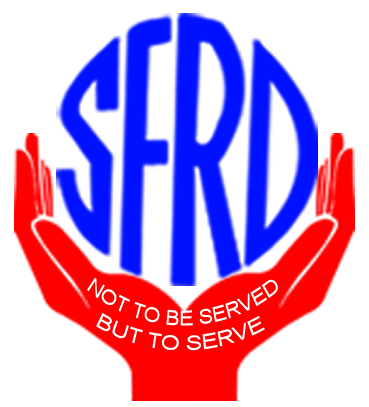OUR NATIONAL FATHER HAS SAID:

NOT TO BE SERVED; BUT TO SERVE
"Recall the face of the Poorest and the most helpless man
whom you may have seen and ask yourself,
If the step you contemplate is going to be of any use to him?
Will he be able to gain anything by it?
Will it restore him to a control over his own life and destiny?
In other words, will it lead to swaraj or self-rule for the hungry?
and also spiritually starved millions of our countrymen?
Then you will find your doubts and yourself melting away."
GENESIS OF SFRD
- A young man with a strong background in Gandhian thought and undying faith in Gandhian ideology and adequately exposed to the spirit of voluntarism promoted the Society For Rural Development (SFRD) in the year 1979.
- A dedicated youth decided to serve the marginalized sections of the community. He deliberately chose agriculturally and industrially backward area in his district (Thiruvannamalai)
- Started targeting on the under-privileged and marginalized sections of the community like bonded weavers, landless, scheduled caste (Adi Dravidar), scheduled tribes (Adivasi), rural artisans, women and children.
- The very first project of the organization was launched with the primary objective of releasing the bonded Labours and Weavers from the clutches of master weavers and Landlords rehabilitating them through a package of socio-economic activities.
- The organisation after gaining enough experience and initial momentum spread its net wider and extended their activities in The areas of Income Generation Programme, Education, Health, Awareness Generation, Housing, Sanitation, Agriculture and Tribal Development .
AREA OF OPERATION
- The area of operation of the organisation is confined to two development blocks viz.,
- Kalasapakkam
- Jawadhu Hills - in Thiruvannamalai District of Tamil Nadu
VISION
- The vision of the SFRD is to create an enabling environment where rural poor could actively participate in a development process that would help them to have free and easy access to better education, better health and better livelihood opportunities on a sustainable basis.
MISSION
- Established as an NGO on Gandhian principles of truth, non-violence, humanism and dignity of labour, SFRD's mission is to empower the rural poor for promoting self-reliant and self-supporting equitable socio-economic order in the rural society.
GOALS
- Promoting physical, intellectual and socio-economic welfare of the Rural and Tribal poor.
- Developing understanding and co-operation, unity of action and local leadership among the rural community.
- Facilitating the culture of self-supporting and self-reliance in socio-economic facets of the life of the rural community on a sustainable basis.
OBJECTIVES
- To undertake and implement development programmes in the fields of education, health, family welfare, agriculture and animal husbandry and cottage and village industries in collaboration with national and international donor agencies for the betterment of rural community.
- To act as service agency for the farming community by supplying agricultural implements, manure and fertilisers, cattle feed and such other inputs essential to accelerate the process of development in agriculture and other allied activities.
- To initiate, undertake and implement programmes, specific schemes and programme for vulnerable sections of the community such as children and women for holistic development of families.
- To educate the various sections of the community on their rights, duties and responsibilities in order to enhance their participation in nation building activities as responsible citizens
- To create awareness on better nutrition, better health practices, protection of environment in order to promote a physically and mentally healthy community.
- To organize community-based institutions like youth club, women club, self-help groups, and farmer's association in order to institutionalize local initiatives
- To impart training in farm and non-farm activities to different sections of the community for upgrading their skills and thereby improve their productivity.
- To recruit, train and employ personnel, extension workers, technicians and other community workers to carry out the various activities of the organisation.



